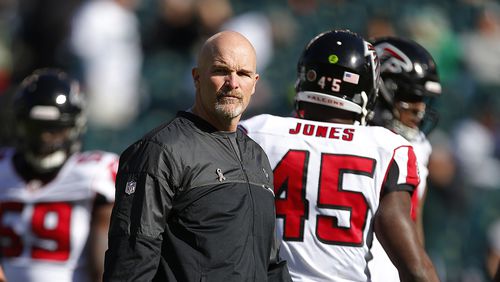Dan Quinn has reviewed all of the stats and film from the precipitous decline of his offense last season.
The Falcons coach knows the rankings show that one of the most prolific scoring units in the history of game turned into a run of the mill unit that was basically a field goal making machine under first-year coordinator Steve Sarkisian.
In the divisional playoff game, the Falcons once potent attack was held to 10 points and kept out of the end zone from the 2-yard line by Philadelphia, which went on to win Super Bowl LII.
The Falcons’ major offseason project is to fix the offense.
“Stats can be turned a lot of ways,” Quinn said this week from the NFL scouting combine. “They don’t always tell the whole story.”
The offense averaged 33.8 points per game under coordinator Kyle Shanahan in 2016. It then dropped to 22.1 points last season, which ranked 15th and nearly out of the top half of the NFL. The 540 points scored in 2016 was tied with the 2000 Rams for the seventh-most in NFL history as the Falcons advanced to Super Bowl LI.
“I think turnover margin tells a lot of the story,” Quinn said of the issues from year to year. “Explosive plays tell a lot of the story. How many you get. How many you give up. The scoring offense.”
Quinn is counting on new quarterbacks coach Greg Knapp, a former NFL offensive coordinator who’s worked with Matt Schaub, Michael Vick and Peyton Manning, to help iron out the units’ problems.
Knapp is already working on fixes.
“He’s had fresh eyes on our seasons over the last couple of years,” Quinn said. “He’s watched all of the games, all of the tape. This part of the offseason, now is the time that we audit. What can we change around and whose responsibilities will be different in different parts of the game plan.”
Quinn also believes that new running backs coach Bernie Parmalee will help increase the production of the rushing attack.
“We really love to feature our running backs,” Quinn said. “Not just in the run game, but in the passing game. Bernie has experience both playing and coaching at the position and that was a real factor for us.”
Quinn went through a long list of candidates before selecting Parmalee.
“We met with him offensively, with the defensive (coaches) and even the special teams guys met with him,” Quinn said. “He’s been a terrific fit for us. We are excited about what he can bring to our offense. He’s got great diversity and (knows) different styles. We expect him to have a role on (special) teams as well. That was a big part of his career as well.”
Knapp replaced Bush Hamdan, who was a rookie NFL coach last season and needed help with the quarterbacks.
“Not only can Sark focus so much of his time on the offense, but last year he had to do double duty of coaching offense and quarterbacks,” Quinn said. “Having a guy with Greg’s experience to lean on is a great asset for us this year.”
Knapp, 54, was the Falcons offensive coordinator from 2004-06. He helped the Falcons get to the NFC championship game with Vick at quarterback after the 2004 season. He has also coached at San Francisco, Oakland, Seattle, Houston and Denver.
He coached with Quinn in San Francisco (2001-03) and Seattle (2009). He was Peyton Manning’s position coach when the Broncos won Super Bowl 50.
“We were really challenged to find the best fit for us, the best fit for Matt (Ryan) and for Sark,” Quinn said. “Greg has a terrific background. He has a lot of experience in the system that we run. That came from Houston, with Gary (Kubiak) and Kyle (Shanahan) and into our system as well. So, some of that cross over has been really good for him.”
While re-tooling the offense, the Falcons plan to add more power packages to the run game.
They Falcons struggled in short-yardage situations under Shanahan and Sarkisian, who both tended to call finesse plays in an attempt to fool defenses. There was the infamous pass on third-and-1 and the Jet Sweep on the 1-yard against New England in Super Bowl LI.
“When you count the third-and-1s, the fourth-and-1s some of the time, even in the low red zone in some areas, we are going to run it,” Quinn said. “They know we are going to run it and we are going to do it anyway.”
The Falcons are considering a better lead-blocking fullback. They are also taking a long look at both guard positions, which were manned by Andy Levitre and Wes Schweitzer last season.
“As we go through it, some of it is scheme, and we’ll for sure look into that and to add to the mix on some guys who would almost have a unique role just for that,” Quinn said. “We are looking into every option for that.”
Quinn said he learned a lesson from legendary coach Bill Walsh to have some role players for specific situation.
“He might be a short-yardage fullback,” Quinn said. “When you used the term ‘power,’ I know where you’re coming from. (Are) there other guys that we can put in unique spots to make plays?”
In addition to limiting turnovers, creating more explosive plays and adding some power to the short-yardage package, the Falcons are counting on third-year tight end Austin Hooper to improve his play. The tight end can be another option for the offense.
He caught 49 of 65 targets (75.3 percent) for 526 yards and three touchdowns last season as he moved into a starting role.
“We are really pumped about what Austin can do,” Quinn said. “He’s got athleticism. He’s a good matchup getting onto safeties and (linebackers).”
Hooper is not the first option on many plays, but if teams leave him in single coverage, he needs to make the play.
“There are a number of guys who are real weapons,” Quinn said. “If you’re going to make sure that coverage goes to Julio (Jones) or you are going to try to put special coverage over to (Mohamed Sanu) on third down or on Devonta (Freeman) or Tevin (Coleman) as a running back. ... There is another player (Hooper) that you have to matchup with. That’s what we are hopeful that we help Hoop get to that spot.”
This will be a big offseason for Hooper, 23, who was drafted in the third round of the 2016 draft and was a true junior coming out of Stanford.
“We are very excited about what he can be,” Quinn said. “That will be a big challenge for him this offseason, to be the best player that and be the best version of himself.”
About the Author




/cloudfront-us-east-1.images.arcpublishing.com/ajc/P7DYBH6TO7FEKG4SUXQQKADRXE.jpg)


